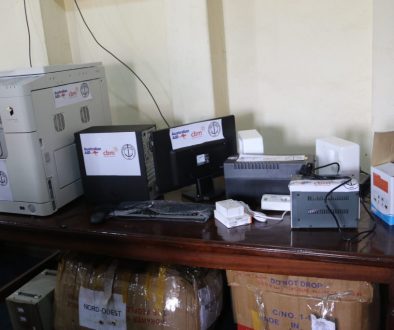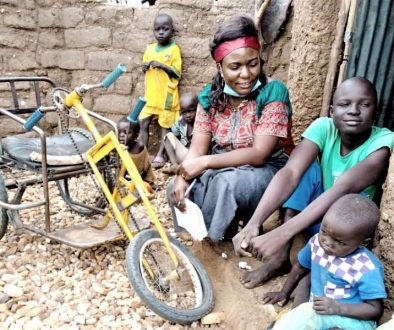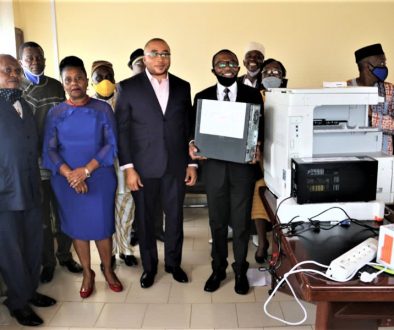CBCHS participates in 2018 CBR conference and LINC meeting with 3 presentations highlighted
Use of communities of practice to strengthen rehabilitation and disability inclusive development practices; the role of multiple stakeholder engagement in sustaining inclusive education; and Community Based Rehabilitation (CBR) as a strategy for advancing inclusive education in resource limited settings were highlighted in the 2018 Community Based Rehabilitation (CBR) conference in Lusaka Zambia .
These presentations were selected abstract submitted by the CBCHS for the conference .During the conference, the Socio Economic Empowerment of Persons with Disability (SEEPD) Program Manager Mr Awa Jacques Chirac and Empowerment Disability and Inclusive Development Program (EDID) Program Mrs Agho Glory who represented the CBCHS gave participants a treat with their experience on the above topics
The conference which brought together over 400 delegates from 42 countries took place from May 11th to 14th 2018 under the theme “CBR for resilience building and sustainable development leave no one behind”
The objective of the conference was to deliberate on the shift from the Community Based Rehabilitation (CBR) to Community Based Inclusive Development (CBID) amongst other things
To situate the role of the WHO in the transition from CBR to CBID, the Coordinator of Disability and Rehabilitation Unit, World Health Organization (WHO) –Alarcas Cieza presented a key note address in which she unequivocally stated that WHO shall, through its Rehabilitation 2030 strategy, ensure rehabilitation is given greater priority in developing countries.
Discussions on the shift from CBR to CBID, triggered participants to wonder about the rehabilitation element of the CBR strategy. However, within the framework of this shift, WHO shall through a top-bottom approach, working with governments, support governments to ensure that rehabilitation becomes part of their universal health coverage designs.
In his opening address, the President of Zambia, HE Edgar Chagwa Lungu, reiterated the commitment of his government in promoting disability inclusive development. His commitment was further supported by the presence of his wife in the plenary sessions of the workshop during which she declared their readiness to move with CBID.
The CAN Conference was also characterized by presentations on neglected tropical diseases and CBR; action research; documentation and information sharing; CBR/CBID training and education; livelihood initiatives for resilience building with three presentations from the CBCHS.
The conference also provided an opportunity to lay emphasis on the key competencies required by a field CBR worker. Some of the key competencies identified were basic technical skills in disability management, communication and diagnostic skills amongst others.
The conference ended with field visits to different locations to enable participants share and learn from the Zambian context.
On the heels of the conference was a LINC (Liliane Foundation Inclusion) Africa network from 12 to 15 May 2018 at Creasta Golf View Hotel in Lusaka Zambia. The conference which was attended by members of the Strategic Partner Organizations (SPO) of Liliana Foundation (LF) from 18 English and French African Countries had as objectives to reflect on the work of LINC Africa since inception in 2017, share and learn from different SPOs’ experiences and develop a regional strategy for the LINC Africa Network
Amongst the things deliberated in the conference was the LINC brand; breaking down barriers research, best practices from different SPOs including the CBCHS, facilitation on the formulation of a regional strategy by a hired consultancy firm ,the presentation of the 2018 to 2020 multi-annual plan , flow model of LF and its implication to SPOs.
The conference was also attended by the chairman of the LF Advisory council, Jacobus Hubertus Van Ham and the LF outgoing Director, Kees van den Broek, who handed over to the incoming Director Steven Berdinis van Berlekom.
The participation of two of CBCHS’ leaders in both the CBR conference and LINC meeting is proof of her leadership in Disability Inclusive Development which has earned the organization applauds in several occasions.
NW Procureur General posed to partner with CBCHS
The Procureur General of Northwest Region has pledged his commitment to partner with the Socio Economic Empowerment of Persons with Disability (SEEPD) Progamm of the CBC Health Services (CBCHS) to ensure that persons with disabilities have access to justice Magistrat Njie Albert Nganje was speaking on June 5th 2018 during an advocacy visit that the SEEPD Program paid to his office.
The delegation during the visit was made up of the SEEPD Program Manager Mr Awa Jacque Chirac, SEEPD Legal Adviser Fet Sama and SEEPD Child Protection Officer Nsono Josephine The objective of the visit was to seek ways of enhancing access to justice for people and children with disabilities in the Northwest
The head of the delegation Mr Awa Jacques Chirac presented the SEEPD Program and expatiated on the Child Protection component of the Program which is focus on ensuring that children are safe especially children with disability given that they are vulnerable to abuse in the society.
Haven’t highlighted the challenges that children with disability face and what the SEEPD Program have been doing to protect children over the years, Mr. Awa maintained that for these vulnerable cadre of members of society to freely access the justice system, it was incumbent on the SEEPD Program and the Procureure General to ascertain the levels and nature of barriers in terms of infrastructure, communication and access to information by persons with particular disabilities including visual and hearing impairments. Gaps noticed during this process, Mr. Awa continued will be used to inform the next phase of the program in terms of interventions which may include but not limited to capacity building of both the staff of the legal department and judicial police.
Elated with the presentation, the Procuere General stated emphatically that like medical doctors and lawyers persons with disabilities must be attended to first when they go to access judicial services .He applauded the CBCHS in its strives to protect children pledging his readiness to collaborate with the SEEPD Program to ensure that children with and without disability are kept safe.
The outcome of discussion during the visit is one of the greatest achievements the SEEPD Program has recorded in its Child Protection component given that it has face some challenges in following up abuse cases in courts because the courts have not intentionally thought of mainstreaming children with disability in general. It will thus be a dream come true for the SEEPD Program if the outcome of discussions does not only end on papers but goes down into implementation
By Nsono Josephine and Fru Rita Ngum


